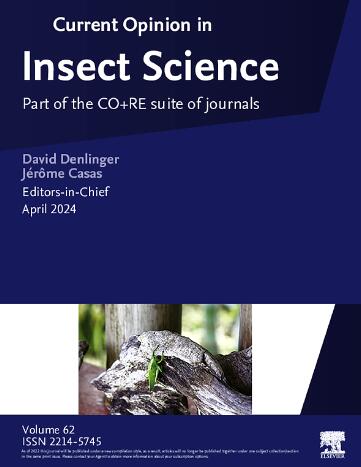The dose makes the poison: plant toxin concentrations and herbivore immunity against pathogens and parasitoids
IF 4.8
1区 农林科学
Q1 BIOLOGY
引用次数: 0
Abstract
Hormesis, the phenomenon in which low doses of toxins promote beneficial biological responses and higher doses compromise these responses, offers an underexplored framework for understanding herbivore eco-immunology. Here, we explore how insect herbivores might exploit plant secondary metabolites to enhance immune function. We propose that herbivores experience a ‘window of enhanced immunity,’ where toxins confer immune benefits at low concentrations, but suppress immune responses at higher concentrations. This concept bridges the interplay between bottom-up (plant defense) and top-down (natural enemy) pressures, providing insights into how herbivores balance challenges posed by exposure to plant toxins and exposure to their natural enemies. We discuss how both generalist and specialist herbivores navigate this balance, highlighting the evolutionary adaptations that influence their strategies. We suggest that the immune systems of specialist and generalist herbivores may both exhibit hormetic responses to plant toxins, although the shape of this relationship likely differs depending on their ability to detoxify and sequester plant toxins.
剂量产生毒素:植物毒素浓度和草食动物对病原体和类寄生虫的免疫力。
激效效应,即低剂量毒素促进有益的生物反应而高剂量毒素损害这些反应的现象,为理解草食动物生态免疫学提供了一个尚未被探索的框架。在这里,我们探讨昆虫食草动物如何利用植物次生代谢物来增强免疫功能。我们认为食草动物经历了一个“增强免疫力的窗口期”,即毒素在低浓度下赋予免疫益处,但在高浓度下抑制免疫反应。这个概念连接了自下而上(植物防御)和自上而下(天敌)压力之间的相互作用,为食草动物如何平衡暴露于植物毒素和暴露于天敌所带来的挑战提供了见解。我们讨论了通才食草动物和专才食草动物如何在这种平衡中生存,强调了影响它们策略的进化适应。我们认为,专业食草动物和通才食草动物的免疫系统都可能对植物毒素表现出过敏反应,尽管这种关系的形式可能因其解毒和隔离植物毒素的能力而异。
本文章由计算机程序翻译,如有差异,请以英文原文为准。
求助全文
约1分钟内获得全文
求助全文
来源期刊

Current opinion in insect science
BIOLOGYECOLOGYENTOMOLOGY-ECOLOGY
CiteScore
10.40
自引率
1.90%
发文量
113
期刊介绍:
Current Opinion in Insect Science is a new systematic review journal that aims to provide specialists with a unique and educational platform to keep up–to–date with the expanding volume of information published in the field of Insect Science. As this is such a broad discipline, we have determined themed sections each of which is reviewed once a year.
The following 11 areas are covered by Current Opinion in Insect Science.
-Ecology
-Insect genomics
-Global Change Biology
-Molecular Physiology (Including Immunity)
-Pests and Resistance
-Parasites, Parasitoids and Biological Control
-Behavioural Ecology
-Development and Regulation
-Social Insects
-Neuroscience
-Vectors and Medical and Veterinary Entomology
There is also a section that changes every year to reflect hot topics in the field.
Section Editors, who are major authorities in their area, are appointed by the Editors of the journal. They divide their section into a number of topics, ensuring that the field is comprehensively covered and that all issues of current importance are emphasized. Section Editors commission articles from leading scientists on each topic that they have selected and the commissioned authors write short review articles in which they present recent developments in their subject, emphasizing the aspects that, in their opinion, are most important. In addition, they provide short annotations to the papers that they consider to be most interesting from all those published in their topic over the previous year.
 求助内容:
求助内容: 应助结果提醒方式:
应助结果提醒方式:


